23 aug 2015

An armed man walks past a graffiti of late Yasser Arafat on July 25, 2015, in Lebanon's Ain al-Hilweh refugee camp
The leaders of Palestinian factions in Lebanon's largest Palestinian refugee camp said in a statement Sunday that they had agreed to a "ceasefire" inside the camp, a day after intense clashes left three dead and at least 18 wounded.
The faction leaders said they met to discuss the deteriorating security situation in Ain al-Hilweh refugee camp in southern Lebanon. The Palestinian ambassador to Lebanon, Ashraf Dabbour, also reportedly took part in the talks.
They condemned Saturday's failed assassination attempt on the camp's Fatah security chief, Ashraf al-Armoushi, and agreed to punish anyone who threatens stability inside the camp.
The statement added that security forces were being deployed across the camp for security purposes. It was not clear whether representatives of the Jund al-Sham militant group, which reportedly attempted to carry out the assassination, were involved in the meeting.
Three Palestinians were killed and at least 18 injured during clashes that erupted when militants attempted to gun down al-Armoushi while he was attending a funeral. Lebanese media reported that al-Armoushi was unharmed in the attack, but two Fatah members were killed and up to 18 other Palestinians injured in the subsequent gun battles.
Ain al-Hilweh refugee camp has seen growing unrest in recent months, with clashes breaking out on a number of occasions. Last month, a senior Fatah official, Colonel Talal al-Ourdouni, was shot dead in the camp in a drive-by shooting.
The camp has reportedly been a breeding ground for extremist groups due to its high poverty levels. Most Palestinians live in squalid conditions in Lebanon's 12 official camps given to Palestinian refugees who fled their homes during the establishment of Israel in 1948. The Lebanese army does not enter the camps, under a tacit deal agreed after the 1975-1990 civil war, and Palestinian factions are responsible for security.
The leaders of Palestinian factions in Lebanon's largest Palestinian refugee camp said in a statement Sunday that they had agreed to a "ceasefire" inside the camp, a day after intense clashes left three dead and at least 18 wounded.
The faction leaders said they met to discuss the deteriorating security situation in Ain al-Hilweh refugee camp in southern Lebanon. The Palestinian ambassador to Lebanon, Ashraf Dabbour, also reportedly took part in the talks.
They condemned Saturday's failed assassination attempt on the camp's Fatah security chief, Ashraf al-Armoushi, and agreed to punish anyone who threatens stability inside the camp.
The statement added that security forces were being deployed across the camp for security purposes. It was not clear whether representatives of the Jund al-Sham militant group, which reportedly attempted to carry out the assassination, were involved in the meeting.
Three Palestinians were killed and at least 18 injured during clashes that erupted when militants attempted to gun down al-Armoushi while he was attending a funeral. Lebanese media reported that al-Armoushi was unharmed in the attack, but two Fatah members were killed and up to 18 other Palestinians injured in the subsequent gun battles.
Ain al-Hilweh refugee camp has seen growing unrest in recent months, with clashes breaking out on a number of occasions. Last month, a senior Fatah official, Colonel Talal al-Ourdouni, was shot dead in the camp in a drive-by shooting.
The camp has reportedly been a breeding ground for extremist groups due to its high poverty levels. Most Palestinians live in squalid conditions in Lebanon's 12 official camps given to Palestinian refugees who fled their homes during the establishment of Israel in 1948. The Lebanese army does not enter the camps, under a tacit deal agreed after the 1975-1990 civil war, and Palestinian factions are responsible for security.
22 aug 2015
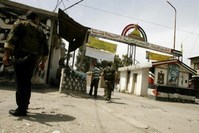
The Ain al-Hilweh Palestinian refugee camp on the outskirts of the southern Lebanese city of Sidon
Three Palestinians were killed and at least 18 injured during clashes that erupted in Lebanon's largest Palestinian refugee camp following a failed assassination attempt on the camp's security chief, Lebanese media reported.
Lebanese television channel al-Manar reported that clashes broke out in Ain al-Hilweh refugee camp in Lebanon's south following an assassination attempt on Ashraf al-Armoushi, the Fatah security chief inside the camp.
Gunmen reportedly belonging to the Jund al-Sham militant group attempted to gun down al-Armoushi while he was attending the funeral of a senior Fatah member. Al-Manar reported that al-Armoushi was left unharmed in the attack, but one of his bodyguards was killed and three injured.
The report identified the killed bodyguard as Mustafa Saleh, and the three injured as Waleed al-Basha, Tarek Badran, and Hamada Awad.
Unconfirmed reports from other sources said that al-Armoushi had sustained wounds and was taken to hospital in a critical condition. Another two unidentified Palestinians were killed during the clashes, and at least 15 others injured, including a number of civilians, Lebanese newspaper the Daily Star reported.
Al-Manar said that the security situation remained severely tense inside the camp, where many shops were forced to close during the fighting. Ain al-Hilweh refugee camp has seen growing unrest in recent months, with clashes breaking out on a number of occasions.
Last month, a senior Fatah official, Colonel Talal al-Ourdouni, was shot dead in the camp in a drive-by shooting. The camp has also been a breeding ground for extremist groups due to high poverty levels among residents.
Most Palestinians live in squalid conditions in the Lebanon's 12 official camps dedicated refugees who fled their homes during the establishment of Israel in 1948. The Lebanese army does not enter the camps, under a tacit deal agreed after the 1975-1990 civil war, and Palestinian factions are responsible for security.
Three Palestinians were killed and at least 18 injured during clashes that erupted in Lebanon's largest Palestinian refugee camp following a failed assassination attempt on the camp's security chief, Lebanese media reported.
Lebanese television channel al-Manar reported that clashes broke out in Ain al-Hilweh refugee camp in Lebanon's south following an assassination attempt on Ashraf al-Armoushi, the Fatah security chief inside the camp.
Gunmen reportedly belonging to the Jund al-Sham militant group attempted to gun down al-Armoushi while he was attending the funeral of a senior Fatah member. Al-Manar reported that al-Armoushi was left unharmed in the attack, but one of his bodyguards was killed and three injured.
The report identified the killed bodyguard as Mustafa Saleh, and the three injured as Waleed al-Basha, Tarek Badran, and Hamada Awad.
Unconfirmed reports from other sources said that al-Armoushi had sustained wounds and was taken to hospital in a critical condition. Another two unidentified Palestinians were killed during the clashes, and at least 15 others injured, including a number of civilians, Lebanese newspaper the Daily Star reported.
Al-Manar said that the security situation remained severely tense inside the camp, where many shops were forced to close during the fighting. Ain al-Hilweh refugee camp has seen growing unrest in recent months, with clashes breaking out on a number of occasions.
Last month, a senior Fatah official, Colonel Talal al-Ourdouni, was shot dead in the camp in a drive-by shooting. The camp has also been a breeding ground for extremist groups due to high poverty levels among residents.
Most Palestinians live in squalid conditions in the Lebanon's 12 official camps dedicated refugees who fled their homes during the establishment of Israel in 1948. The Lebanese army does not enter the camps, under a tacit deal agreed after the 1975-1990 civil war, and Palestinian factions are responsible for security.
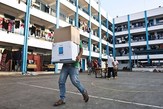
By: IRIN
Schools open on time. It hardly sounds like news, but for half a million Palestinian refugee children it certainly is. On Wednesday, the UN body that looks after Palestinian refugees, UNRWA, announced it had overcome a $101 million deficit and the school year wouldn’t have to be delayed after all.
After a desperate funding drive, Gulf Arab countries and the United States filled the gap, but with more refugees, growing needs and little new donor money, the underlying problems remain. It is clear the agency must make radical changes to avoid being in the same situation next year.
IRIN sat down with UNRWA Commissioner-General Pierre Krahenbuhl to find out how the agency overcame what he said was its “most serious financial crisis ever” and what he plans to do to keep it out of trouble for good. In a wide-ranging interview, he addresses new school class sizes, the organisation's financial situation and protests against his leadership.
On Wednesday, you announced that UNWRA schools would start on time. Do you now have enough money to guarantee they will be open for the entire academic year?
I think we’re good for this year because we have roughly $80 million out of the $101 that we needed. So we have an outstanding contribution by the European Union… We may need one or two other donors, but I think essentially we’re there.You have raised the class numbers you use for planning in UNRWA schools to 50 children.
How will this affect how many teachers you employ?
We don't know yet because the class formation exercise hasn't been completed. It’s still being finalised. They’re going to complete it now for the West Bank and Gaza, now that they know the school year will open. There are still debates around that, among teachers, unions and others, but it has to be understood first of all the ceiling of 50 existed already a few years ago, so it is a ceiling that has been used in the past. The average will probably be somewhere around 41 or 42. That is compared to an average of previous years around 38, 37.
It’s obviously an increase in the number of children per classroom, so in principle you should have fewer teachers in some places, but for the moment we don't have the full picture on that. This does seem to be an ongoing problem with UNRWA – funding comes in at the last minute and every few years there is a financial crisis.
We know needs are increasing and funding is short, so what kind of long-term changes are you considering in how the agency works to avoid this?
There are very few agencies in the humanitarian system that don’t have deficits or funding shortfalls against needs, but the thing about this year is that never before had it put our immediate core activities – and particularly our flagship education program – at risk. That’s unprecedented. So I need everybody to understand that this is not just another financial deficit year, it’s a year where we came much closer than we ever should have to having the school year delayed – not because of war like last year in Gaza – but a funding shortfall.
That should never have happened.We should never again be in a situation where the school year is at risk. That will require, again, a certain number of internal steps and outreach to donors and there will be a series of meetings taking place that we will try to organise with the League of Arab States, certainly also at the United Nations General Assembly and High Level Segment Week we will try to have ministerial events so we can try to have a proper discussion with the donor countries and institutions that have been most engaged with us to say ‘this [cost-cutting measure] is our contribution but now we really count on you to be able to establish a more predictable form of funding for UNRWA’s core services,’ because we cannot allow the instability, uncertainty and anxiety… to happen again.We are not complaining about the funding levels that we have, because we have $1.2 billion [a year] – that’s a big amount of money.
But it’s closing the gap between the increased needs resulting from the community and increasing contributions but at a lower level by donors. We need to increase the predictability. What is difficult for UNRWA is that we have these long-term programmes – because we are not only an emergency actor, some of our expenditures don’t fluctuate. They are there, as it is for a ministry in a country.
Can you tell me any specific details of further cost-cutting measures that you will take internally?
No, because now the 2016 budget process is currently under way. So when we go through that we will.No specific cuts or changes we haven’t heard about?Well, you’re asking me the day after we resolved this. So you’ll have to accept that right now – and I’ll have no problem to list those once we’ve decided them.There are various proposals out there about how UNRWA could move forward more efficiently. For example, it is often suggested that because the majority of Jordanian Palestinian refugees are also citizens of Jordan and eligible for state services, UNRWA could make a huge budget cut if it were to end services there.We are not [going to end] services in any of our fields for two different reasons. One is we have a mandated responsibility, and people sometimes forget that dimension. We are mandated to deliver services for Palestinian refugees in these five fields of operation… at the end of the day the mandate is a General Assembly mandate so we can’t redesign the fields in which we operate and make that kind of distinction.
And I think it would be seriously underestimating the current pressures that exist on hosts, as a result of all of the other instability in the region. What we saw with the education program is reducing the services to Palestinian refugees and failing to address their dignity and other aspects of their rights is a risk the world can’t take, because not only is there an issue in and of itself of the unresolved conflict here between Israel and Palestine with the occupation and all the rest, but there is also an instability in the Middle East that should lead people to reflect very, very carefully on the costs of reducing the services currently available to Palestinian refugees, who already have very limited prospects in life and a very challenging future. Certainly, I think if one would ask the Jordanian authorities, they would have very strong views on any reductions and have always advocated that, and so we are not at all looking along those lines.
What about means-testing, either asking those Palestinian refugees who can pay for services to contribute some amount or re-evaluating who qualifies for services based on need?
We have been operating for a number of years as an agency on the fact that you have a status – that doesn't mean that because you are a registered refugee that everybody applies for services. A very good example was Syria before the war. 560,000 Palestine refugees in Syria, a very small amount of them applying for UNRWA services other than sending their children to schools... Otherwise, most refugees were self-sufficient because in the Syrian context most Palestine refugees were welcome: they had employment, they had their own businesses, they were self-sufficient in that sense.I’ve met so many people in Gaza who used to be employed, who used to employ 10, 20, 50 people in their businesses and were covering their needs, and today they are dependent on UNRWA food distribution.
Why?
Not because they have a status, but because there is a blockade. So it is the circumstances that dictate: blockade in Gaza, conflict in Syria. Today, the Palestine refugee community in Syria is 95 percent dependent on UNRWA. That was never the case previously. So when people look at UNRWA and entitlement and needs-testing, actually to be honest, I’d say if we did needs-based our budget would be much larger. Does UNRWA have any debt? No, we don't have debt, but we don't have reserves either, and that’s a much bigger issue… I’ve worked in other agencies in the humanitarian system, and for an organisation that spends $1.2 billion a year with just about $1 million in reserve means that if donors shut down entirely you could operate for an afternoon, so that’s just not sustainable. We have to be able to rebuild a more solid financial footing, As part of your cost-cutting measures you let go many international staff. Some of these staffers were particularly successful in bringing in grants.
As this means less money long-term, isn’t this cutting off the legs to save the body?
Whenever you have to cut a contract it hurts for the agency, it hurts for the people involved. There was somebody very talented in my executive office who we decided to let go…But when you are in a crisis of $100 million, your options need to include decisions across the board.One of the areas we did not preserve is the area of fundraising because when you have the education programme at risk, there’s no area that can be preserved anymore… So there was no doubt in my mind that we needed to include these tough decisions. It was painful and when you take those kinds of decisions it is legitimate for people to challenge you. It’s completely understood that when you take difficult decisions not everybody’s going to be in agreement with it, not just because those who are concerned personally but even others. As we saw in these last weeks there were some very strong debates among staff, on Facebook pages; there were peaceful demonstrations which I think is good because it’s a sign of solidarity, but there was also some very clear criticism of management, leadership, individuals including myself, and you know that when you enter a time of crisis you are going to have some of that. I accept that completely.Parts of this interview have been condensed for brevity.
Schools open on time. It hardly sounds like news, but for half a million Palestinian refugee children it certainly is. On Wednesday, the UN body that looks after Palestinian refugees, UNRWA, announced it had overcome a $101 million deficit and the school year wouldn’t have to be delayed after all.
After a desperate funding drive, Gulf Arab countries and the United States filled the gap, but with more refugees, growing needs and little new donor money, the underlying problems remain. It is clear the agency must make radical changes to avoid being in the same situation next year.
IRIN sat down with UNRWA Commissioner-General Pierre Krahenbuhl to find out how the agency overcame what he said was its “most serious financial crisis ever” and what he plans to do to keep it out of trouble for good. In a wide-ranging interview, he addresses new school class sizes, the organisation's financial situation and protests against his leadership.
On Wednesday, you announced that UNWRA schools would start on time. Do you now have enough money to guarantee they will be open for the entire academic year?
I think we’re good for this year because we have roughly $80 million out of the $101 that we needed. So we have an outstanding contribution by the European Union… We may need one or two other donors, but I think essentially we’re there.You have raised the class numbers you use for planning in UNRWA schools to 50 children.
How will this affect how many teachers you employ?
We don't know yet because the class formation exercise hasn't been completed. It’s still being finalised. They’re going to complete it now for the West Bank and Gaza, now that they know the school year will open. There are still debates around that, among teachers, unions and others, but it has to be understood first of all the ceiling of 50 existed already a few years ago, so it is a ceiling that has been used in the past. The average will probably be somewhere around 41 or 42. That is compared to an average of previous years around 38, 37.
It’s obviously an increase in the number of children per classroom, so in principle you should have fewer teachers in some places, but for the moment we don't have the full picture on that. This does seem to be an ongoing problem with UNRWA – funding comes in at the last minute and every few years there is a financial crisis.
We know needs are increasing and funding is short, so what kind of long-term changes are you considering in how the agency works to avoid this?
There are very few agencies in the humanitarian system that don’t have deficits or funding shortfalls against needs, but the thing about this year is that never before had it put our immediate core activities – and particularly our flagship education program – at risk. That’s unprecedented. So I need everybody to understand that this is not just another financial deficit year, it’s a year where we came much closer than we ever should have to having the school year delayed – not because of war like last year in Gaza – but a funding shortfall.
That should never have happened.We should never again be in a situation where the school year is at risk. That will require, again, a certain number of internal steps and outreach to donors and there will be a series of meetings taking place that we will try to organise with the League of Arab States, certainly also at the United Nations General Assembly and High Level Segment Week we will try to have ministerial events so we can try to have a proper discussion with the donor countries and institutions that have been most engaged with us to say ‘this [cost-cutting measure] is our contribution but now we really count on you to be able to establish a more predictable form of funding for UNRWA’s core services,’ because we cannot allow the instability, uncertainty and anxiety… to happen again.We are not complaining about the funding levels that we have, because we have $1.2 billion [a year] – that’s a big amount of money.
But it’s closing the gap between the increased needs resulting from the community and increasing contributions but at a lower level by donors. We need to increase the predictability. What is difficult for UNRWA is that we have these long-term programmes – because we are not only an emergency actor, some of our expenditures don’t fluctuate. They are there, as it is for a ministry in a country.
Can you tell me any specific details of further cost-cutting measures that you will take internally?
No, because now the 2016 budget process is currently under way. So when we go through that we will.No specific cuts or changes we haven’t heard about?Well, you’re asking me the day after we resolved this. So you’ll have to accept that right now – and I’ll have no problem to list those once we’ve decided them.There are various proposals out there about how UNRWA could move forward more efficiently. For example, it is often suggested that because the majority of Jordanian Palestinian refugees are also citizens of Jordan and eligible for state services, UNRWA could make a huge budget cut if it were to end services there.We are not [going to end] services in any of our fields for two different reasons. One is we have a mandated responsibility, and people sometimes forget that dimension. We are mandated to deliver services for Palestinian refugees in these five fields of operation… at the end of the day the mandate is a General Assembly mandate so we can’t redesign the fields in which we operate and make that kind of distinction.
And I think it would be seriously underestimating the current pressures that exist on hosts, as a result of all of the other instability in the region. What we saw with the education program is reducing the services to Palestinian refugees and failing to address their dignity and other aspects of their rights is a risk the world can’t take, because not only is there an issue in and of itself of the unresolved conflict here between Israel and Palestine with the occupation and all the rest, but there is also an instability in the Middle East that should lead people to reflect very, very carefully on the costs of reducing the services currently available to Palestinian refugees, who already have very limited prospects in life and a very challenging future. Certainly, I think if one would ask the Jordanian authorities, they would have very strong views on any reductions and have always advocated that, and so we are not at all looking along those lines.
What about means-testing, either asking those Palestinian refugees who can pay for services to contribute some amount or re-evaluating who qualifies for services based on need?
We have been operating for a number of years as an agency on the fact that you have a status – that doesn't mean that because you are a registered refugee that everybody applies for services. A very good example was Syria before the war. 560,000 Palestine refugees in Syria, a very small amount of them applying for UNRWA services other than sending their children to schools... Otherwise, most refugees were self-sufficient because in the Syrian context most Palestine refugees were welcome: they had employment, they had their own businesses, they were self-sufficient in that sense.I’ve met so many people in Gaza who used to be employed, who used to employ 10, 20, 50 people in their businesses and were covering their needs, and today they are dependent on UNRWA food distribution.
Why?
Not because they have a status, but because there is a blockade. So it is the circumstances that dictate: blockade in Gaza, conflict in Syria. Today, the Palestine refugee community in Syria is 95 percent dependent on UNRWA. That was never the case previously. So when people look at UNRWA and entitlement and needs-testing, actually to be honest, I’d say if we did needs-based our budget would be much larger. Does UNRWA have any debt? No, we don't have debt, but we don't have reserves either, and that’s a much bigger issue… I’ve worked in other agencies in the humanitarian system, and for an organisation that spends $1.2 billion a year with just about $1 million in reserve means that if donors shut down entirely you could operate for an afternoon, so that’s just not sustainable. We have to be able to rebuild a more solid financial footing, As part of your cost-cutting measures you let go many international staff. Some of these staffers were particularly successful in bringing in grants.
As this means less money long-term, isn’t this cutting off the legs to save the body?
Whenever you have to cut a contract it hurts for the agency, it hurts for the people involved. There was somebody very talented in my executive office who we decided to let go…But when you are in a crisis of $100 million, your options need to include decisions across the board.One of the areas we did not preserve is the area of fundraising because when you have the education programme at risk, there’s no area that can be preserved anymore… So there was no doubt in my mind that we needed to include these tough decisions. It was painful and when you take those kinds of decisions it is legitimate for people to challenge you. It’s completely understood that when you take difficult decisions not everybody’s going to be in agreement with it, not just because those who are concerned personally but even others. As we saw in these last weeks there were some very strong debates among staff, on Facebook pages; there were peaceful demonstrations which I think is good because it’s a sign of solidarity, but there was also some very clear criticism of management, leadership, individuals including myself, and you know that when you enter a time of crisis you are going to have some of that. I accept that completely.Parts of this interview have been condensed for brevity.
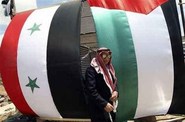
The number of Palestinian refugees who migrated from Syria to Arab and European countries since the beginning of the Syrian crisis exceeded 100,000 refugees, UNRWA revealed on Saturday.
United Nations Relief and Works for Palestine Refugees (UNRWA) revealed, in a press statement on Saturday, that the number of Palestinian refugees who migrated from Syria since the beginning of the conflict in March 2011 until last July reached over 15.5 thousand refugees whereas 45 thousand of others were displaced in Lebanon’s camps.
UNRWA also disclosed, in its statement, that 6 thousand of the refugees of Syria migrated to Egypt. While, the number of those who are demanding to migrate toward Europe mounted to 36 thousand.
United Nations Relief and Works for Palestine Refugees (UNRWA) revealed, in a press statement on Saturday, that the number of Palestinian refugees who migrated from Syria since the beginning of the conflict in March 2011 until last July reached over 15.5 thousand refugees whereas 45 thousand of others were displaced in Lebanon’s camps.
UNRWA also disclosed, in its statement, that 6 thousand of the refugees of Syria migrated to Egypt. While, the number of those who are demanding to migrate toward Europe mounted to 36 thousand.
20 aug 2015
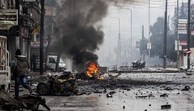
943 Palestinian refugees including 50 women have been held in the Syrian regime prisons and detention centers since the outbreak of the Syrian crisis, the Action Group for Palestinians in Syria (AGPS) reported Wednesday.
The group said that a woman and her elderly mother were detained Tuesday in Aid’in refugee camp in Homs while on their way to Aleppo.
A third detainee was also reported in Aid’in camp, bringing the detainees’ number in the refugee camp to 173 detainees as a whole.
The Action Group pointed out that 411 Palestinian refugees were tortured to death in the Syrian regime prisons.
The group said that a woman and her elderly mother were detained Tuesday in Aid’in refugee camp in Homs while on their way to Aleppo.
A third detainee was also reported in Aid’in camp, bringing the detainees’ number in the refugee camp to 173 detainees as a whole.
The Action Group pointed out that 411 Palestinian refugees were tortured to death in the Syrian regime prisons.
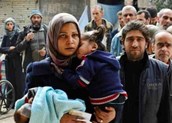
The UN agency for Palestinian refugees, UNRWA, revealed on Wednesday that the Syrian capital's Yarmouk district, which has been under siege by government forces for years, is facing an outbreak of typhoid, a bacterial infection that could be fatal if not treated properly.
UNRWA spokesman Sami Meshashe confirmed at least 11 cases of the disease in Yarmouk, which is home to Palestinian refugees.
UNRWA said it had been able to verify the outbreak after gaining access to al-Yarmouk camp for the first time since June 08, 2015.
UNRWA underlined that its priority remains the delivery of humanitarian aid to civilians within Yarmouk itself.
Meshashe confirmed UNRWA’s demand of abiding by protecting the lives of civilians stressing the need to secure safe conditions which would enable UNRWA to offer aid in this regard.
Yarmouk camp, in southern Damascus, suffers a tightened siege due to battles between the government and opposition forces. Starvation has been threatening the lives of thousands of its residents especially among children and the elderly.
UNRWA spokesman Sami Meshashe confirmed at least 11 cases of the disease in Yarmouk, which is home to Palestinian refugees.
UNRWA said it had been able to verify the outbreak after gaining access to al-Yarmouk camp for the first time since June 08, 2015.
UNRWA underlined that its priority remains the delivery of humanitarian aid to civilians within Yarmouk itself.
Meshashe confirmed UNRWA’s demand of abiding by protecting the lives of civilians stressing the need to secure safe conditions which would enable UNRWA to offer aid in this regard.
Yarmouk camp, in southern Damascus, suffers a tightened siege due to battles between the government and opposition forces. Starvation has been threatening the lives of thousands of its residents especially among children and the elderly.
19 aug 2015
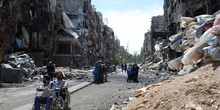
At least six confirmed cases of typhoid in Yalda, and “credible reports” of cases elsewhere, UN says. The U.N. agency for Palestinian refugees on Tuesday reported a typhoid outbreak among civilians from Yarmouk besieged Palestinian refugee camp on the outskirts of the Damascus, with at least six confirmed cases, said the Associated Press.
Christopher Gunness, spokesman for the UNRWA, said its staff gained access to Yalda, an area east of the Yarmouk camp hosting displaced Palestinian refugees and Syrian civilians, for the first time since June 8 and established a mobile health point, reported Al-Jazeera.
UNRWA said in a situation report that its medical personnel provided 211 consultations over the course of Tuesday in Yalda, including confirming six cases of typhoid.
But the refugee agency also noted “credible reports” of a typhoid outbreak in the region with other cases in Yarmouk, Yalda and two other areas, Babila and Beit Sahem.
UNRWA said it was authorized to provide limited health assistance as well as water, sanitation and hygiene supplies to the community.
According to the U.S. Centers for Disease Control and Prevention, typhoid is a life-threatening illness caused by the bacteria Salmonella typhi which is spread by eating contaminated food or drinking contaminated water. It can usually be treated with antibiotics, but can be fatal in some cases without treatment.
UNRWA Commissioner-General Pierre Krahenbuhl said in June that before the Syrian war began in 2011, there were 160,000 Palestinians in the Yarmouk camp, many of whom held jobs. Before the Islamic State in Iraq and the Levant (ISIL) armed group entered the camp in early April, there were 18,000 refugees, but he said several thousand have fled since then and the U.N. has not had access.
“UNRWA’s priority remains the delivery of humanitarian aid to civilians within Yarmouk itself,” Gunness said. “Never has the imperative for sustained humanitarian access been greater.”
Christopher Gunness, spokesman for the UNRWA, said its staff gained access to Yalda, an area east of the Yarmouk camp hosting displaced Palestinian refugees and Syrian civilians, for the first time since June 8 and established a mobile health point, reported Al-Jazeera.
UNRWA said in a situation report that its medical personnel provided 211 consultations over the course of Tuesday in Yalda, including confirming six cases of typhoid.
But the refugee agency also noted “credible reports” of a typhoid outbreak in the region with other cases in Yarmouk, Yalda and two other areas, Babila and Beit Sahem.
UNRWA said it was authorized to provide limited health assistance as well as water, sanitation and hygiene supplies to the community.
According to the U.S. Centers for Disease Control and Prevention, typhoid is a life-threatening illness caused by the bacteria Salmonella typhi which is spread by eating contaminated food or drinking contaminated water. It can usually be treated with antibiotics, but can be fatal in some cases without treatment.
UNRWA Commissioner-General Pierre Krahenbuhl said in June that before the Syrian war began in 2011, there were 160,000 Palestinians in the Yarmouk camp, many of whom held jobs. Before the Islamic State in Iraq and the Levant (ISIL) armed group entered the camp in early April, there were 18,000 refugees, but he said several thousand have fled since then and the U.N. has not had access.
“UNRWA’s priority remains the delivery of humanitarian aid to civilians within Yarmouk itself,” Gunness said. “Never has the imperative for sustained humanitarian access been greater.”
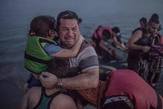
Lebanon's state-run National News Agency says a boat carrying about 40 Palestinians from a refugee camp in Syria capsized en route to Turkey and that at least nine migrants drowned.
Wednesday's report says the vessel left the northern Lebanese port of Tripoli on Monday and capsized after entering Turkish territorial waters. It says those on board were Palestinians from the Yarmouk refugee camp in Damascus.
NNA says women and children were among the dead. It says survivors were taken to hospitals in Turkey.
The U.N. says about 264,500 people have crossed the Mediterranean Sea so far this year, trying to reach Europe. That compares to 219,000 for all of 2014, according to the International Organization for Migration. IOM estimates almost 2,350 people have died this year on those sea journeys.
Nine Palestinians Dead as Vessel Capsizes Off Turkish Coast
At least nine Palestinian refugees died on Wednesday, after an overloaded boat carrying illegal migrants fleeing the Syrian conflict capsized off the coast of Turkey, according to media sources.
The boat earlier set sail from the Lebanese seaport Tripoli and was destined for Turkey, but hours later it capsized in international waters due to its overload. Among the victims were women and children, WAFA sources said.
In September 2014, about 15 Palestinian migrants attempting to flee the besieged and war-torn Gaza Strip died after their boat capsized in the Mediterranean Sea off the coast of northern Egypt.
The International Organization for Migration said “By far the largest number of migrant deaths internationally have taken place in the Mediterranean.”
It said that a total of 2,350 migrants were reported dead after drowning in the Mediterranean out of 3,256 deaths worldwide.
The data which is valid as of July 31, 2015 for Malta and Italy and June 30, 2015 for Greece reveal around 93,000 migrants have arrived in these countries, including maritime and land arrivals.
According to UNRWA, the Syrian civil war has so far displaced over 50 percent of the registered refugee population, including over 270,000 within Syria itself.
“The escalating violence [in Syria] makes movement and access more difficult and causes severe hardship for Palestine refugees,” says UNRWA. “The particular vulnerabilities of Palestine refugees and their sensitive status in the region compound the already stark and violent devastation they share with Syrians.”
Wednesday's report says the vessel left the northern Lebanese port of Tripoli on Monday and capsized after entering Turkish territorial waters. It says those on board were Palestinians from the Yarmouk refugee camp in Damascus.
NNA says women and children were among the dead. It says survivors were taken to hospitals in Turkey.
The U.N. says about 264,500 people have crossed the Mediterranean Sea so far this year, trying to reach Europe. That compares to 219,000 for all of 2014, according to the International Organization for Migration. IOM estimates almost 2,350 people have died this year on those sea journeys.
Nine Palestinians Dead as Vessel Capsizes Off Turkish Coast
At least nine Palestinian refugees died on Wednesday, after an overloaded boat carrying illegal migrants fleeing the Syrian conflict capsized off the coast of Turkey, according to media sources.
The boat earlier set sail from the Lebanese seaport Tripoli and was destined for Turkey, but hours later it capsized in international waters due to its overload. Among the victims were women and children, WAFA sources said.
In September 2014, about 15 Palestinian migrants attempting to flee the besieged and war-torn Gaza Strip died after their boat capsized in the Mediterranean Sea off the coast of northern Egypt.
The International Organization for Migration said “By far the largest number of migrant deaths internationally have taken place in the Mediterranean.”
It said that a total of 2,350 migrants were reported dead after drowning in the Mediterranean out of 3,256 deaths worldwide.
The data which is valid as of July 31, 2015 for Malta and Italy and June 30, 2015 for Greece reveal around 93,000 migrants have arrived in these countries, including maritime and land arrivals.
According to UNRWA, the Syrian civil war has so far displaced over 50 percent of the registered refugee population, including over 270,000 within Syria itself.
“The escalating violence [in Syria] makes movement and access more difficult and causes severe hardship for Palestine refugees,” says UNRWA. “The particular vulnerabilities of Palestine refugees and their sensitive status in the region compound the already stark and violent devastation they share with Syrians.”
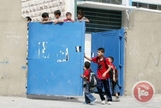
The UN agency for Palestinian refugees said, Wednesday, that the school year for half a million Palestinian refugees would start on time, after an eleventh hour scramble to cover a $101 million deficit.
UNRWA Commissioner-General Pierre Krahenbuhl said in a statement: "I am pleased to declare the 2015/16 UNRWA school year open."
He said that the agency had been able to secure just short of $80 million in contributions against its $101 million deficit.
He affirmed UNRWA's commitment to its schools, "because of how central education is to the identity and dignity of Palestine refugees and of the 500,000 boys and girls whose future depends on learning and developing skills in our 685 schools."
"It is on the benches and behind the desks of UNRWA classrooms that millions of Palestine refugees, deprived for so long of a just and lasting solution, have built the capabilities and shaped the determination that enabled them to become actors of their own destinies."
He added, according to Ma'an, that education was a fundamental right that never should have risked delay.
In recent weeks, Palestinian refugees across the occupied Palestinian territory have staged a number of demonstration to protest the UN agency cuts and the potential delay to the school year. Krahenbuhl said that UNRWA had "heard the serious concerns expressed by host countries and the refugee community. The peaceful protests that took place over the past weeks showed solidarity and reminded the world of the importance of the work of UNRWA."
Nearly half of the funding shortfall was covered by Saudi Arabia, Kuwait and the United Arab Emirates.
The full list of donors included:
Kingdom of Saudi Arabia: $19 million (confirmed on Aug. 12)
State of Kuwait: $15 million (confirmed on Aug. 17)
United Arab Emirates: $15 million (confirmed on Aug. 18)
United States of America: $15 million (confirmed on Aug. 18)
Switzerland: $5.15 million (confirmed on July 30)
United Kingdom: $4.69 million (confirmed on Aug. 12)
Norway: $2.44 million (confirmed on Aug. 6)
Sweden: $1.7 million (confirmed on Aug. 19)
Slovak Republic : $0.05 million (confirmed on July 25)
UNRWA Commissioner-General Pierre Krahenbuhl said in a statement: "I am pleased to declare the 2015/16 UNRWA school year open."
He said that the agency had been able to secure just short of $80 million in contributions against its $101 million deficit.
He affirmed UNRWA's commitment to its schools, "because of how central education is to the identity and dignity of Palestine refugees and of the 500,000 boys and girls whose future depends on learning and developing skills in our 685 schools."
"It is on the benches and behind the desks of UNRWA classrooms that millions of Palestine refugees, deprived for so long of a just and lasting solution, have built the capabilities and shaped the determination that enabled them to become actors of their own destinies."
He added, according to Ma'an, that education was a fundamental right that never should have risked delay.
In recent weeks, Palestinian refugees across the occupied Palestinian territory have staged a number of demonstration to protest the UN agency cuts and the potential delay to the school year. Krahenbuhl said that UNRWA had "heard the serious concerns expressed by host countries and the refugee community. The peaceful protests that took place over the past weeks showed solidarity and reminded the world of the importance of the work of UNRWA."
Nearly half of the funding shortfall was covered by Saudi Arabia, Kuwait and the United Arab Emirates.
The full list of donors included:
Kingdom of Saudi Arabia: $19 million (confirmed on Aug. 12)
State of Kuwait: $15 million (confirmed on Aug. 17)
United Arab Emirates: $15 million (confirmed on Aug. 18)
United States of America: $15 million (confirmed on Aug. 18)
Switzerland: $5.15 million (confirmed on July 30)
United Kingdom: $4.69 million (confirmed on Aug. 12)
Norway: $2.44 million (confirmed on Aug. 6)
Sweden: $1.7 million (confirmed on Aug. 19)
Slovak Republic : $0.05 million (confirmed on July 25)
17 aug 2015
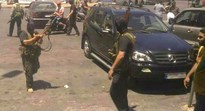
An armed group at dawn Sunday kidnapped a Palestinian refugee from his home in the complex of municipalities in the Iraqi capital Baghdad.
Specialist in Palestinian affairs in Iraq Hasan al-Khaled told the Palestinian Information Center (PIC) that armed men physically and verbally assaulted Ra'ed Ramadan and his family before taking his at gunpoint to an undeclared place.
The residents of the complex, the largest Palestinian community in Iraq, are exposed to raids and kidnappings almost on a daily basis, according to Khaled.
About two weeks ago, 10 Palestinian young men had been kidnapped by armed men, and there is still no information about their whereabouts or the group that abducted them.
Khaled affirmed that the Iraqi authorities and their militias forced the owners of shops and cafes in the complex to close their businesses at 11 o'clock at night, although there is no curfew in Baghdad.
Specialist in Palestinian affairs in Iraq Hasan al-Khaled told the Palestinian Information Center (PIC) that armed men physically and verbally assaulted Ra'ed Ramadan and his family before taking his at gunpoint to an undeclared place.
The residents of the complex, the largest Palestinian community in Iraq, are exposed to raids and kidnappings almost on a daily basis, according to Khaled.
About two weeks ago, 10 Palestinian young men had been kidnapped by armed men, and there is still no information about their whereabouts or the group that abducted them.
Khaled affirmed that the Iraqi authorities and their militias forced the owners of shops and cafes in the complex to close their businesses at 11 o'clock at night, although there is no curfew in Baghdad.
16 aug 2015
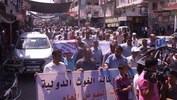
Hundreds of teachers, students and refugees on Saturday participated in a sit-in in Rafah area in protest at the UNRWA's decision to reduce services and postpone the start of the school year.
The participants carried banners condemning the agency's decisions to reduce the services it provides for the Palestinian refugees and calling for giving the refugees their rights fully.
During the protest, dean of the UNRWA Arab employees Suhail al-Hindi warned of a massive revolution by the Palestinian refugees in the face of the UNRWA's unjust decisions.
Hindi stressed that the Palestinian refugees would never accept the suspension of the school year and would stand strongly in the face of all conspiracies that target them.
He appealed to the Palestinian Authority presidency, the Palestine Liberation Organization and the national factions to assume their responsibilities and join forces to face the UNRWA's fait accompli policy.
The participants carried banners condemning the agency's decisions to reduce the services it provides for the Palestinian refugees and calling for giving the refugees their rights fully.
During the protest, dean of the UNRWA Arab employees Suhail al-Hindi warned of a massive revolution by the Palestinian refugees in the face of the UNRWA's unjust decisions.
Hindi stressed that the Palestinian refugees would never accept the suspension of the school year and would stand strongly in the face of all conspiracies that target them.
He appealed to the Palestinian Authority presidency, the Palestine Liberation Organization and the national factions to assume their responsibilities and join forces to face the UNRWA's fait accompli policy.
